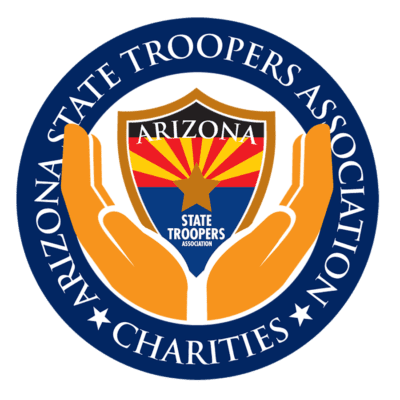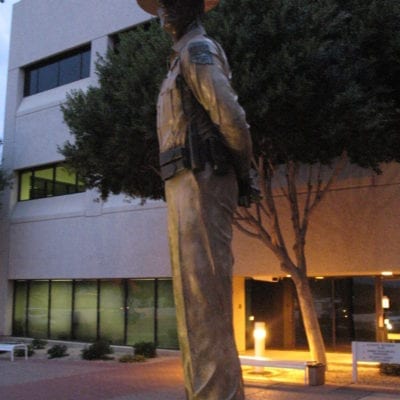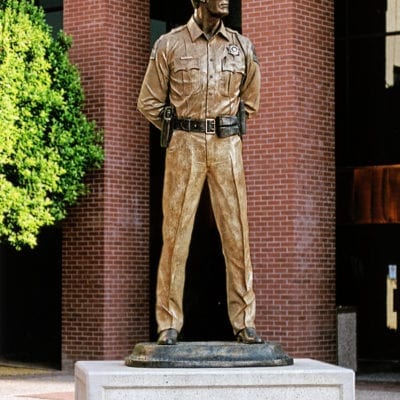Stress, Critical Incidents and Trauma What the police officer’s spouse can do to help
One Christmas Eve when our kids were still little, he called me from the station and told me to check on them. Puzzled, I told him they’d been in bed for hours and were fine . “Just go check ’em,” he said, this time more emphatically. I peeked in their cribs; of course they were sleeping soundly. He was new to the force and had just gone to his first SIDS call.
-Cindy, married to an officer for 13 years.
I had a domestic [call] where a distraught wife called for police protection. Her husband was beating her with a coal iron. When I arrived to rescue the wife and handcuff the drunken husband, the wife turned on me – kicked me in the groin and called me a f***ing pig and told me to get the f*** out of her house. I was frustrated beyond belief but maintained my cool – that is until I got home. I walked in the door to see my two-year-old pulling the dog’s ears and in retaliation, the dog greeted me by peeing on the carpet. I gave him a swift kick down the stairs, spanked my [child] and like a lunatic, ran ranting and raving at my wife for her lack of parental guidance. I’d upset the whole family and it had nothing to do with them. It all happened within 60 seconds of being home.
-Anonymous testimonial from Cops Don’t Cry
When I was a young officer and newly married, I handled a fatal accident involving a teenager who took a local notorious curve at very high speed on his motorcycle. He’d just had a heated argument with his dad and I came upon the wreck right after it happened. I found the kid’s head, still in his helmet, some distance from the point of impact; it had been cleanly decapitated by the guardrail. A minute or two later the father came upon the accident, obviously hysterical. I had to tackle him to keep him from entering the accident scene. I’ll never forget that or the look in that kid’s open eyes. My 10-year-old son knows that he’ll never own a motorcycle if I have anything to say about it.
-Dave, a highway patrol trooper
The jolts got so bad that I would wake my wife up through the night. I’d buck, arching my body backwards and then forward as if an electrical current was raging through me. Sometimes it would even wake me up. I finally saw a doctor, who said it was the stress I was suffering while waiting for blood tests to return after being bitten by an AIDS victim on a call.
-Anonymous testimonial from Cops Don’t Cry
I think I’ve dealt with the mangled bodies on the road, the homicides, sex crimes and officer-involved shootings pretty well. What I’ve found most stressful is the lawsuit that has gone on for years. I wasn’t even involved in the original incident, but I was the sergeant on duty at the time. When you’re looking at losing your house and property and your integrity is being attacked – after having that hanging over your head for a long time, it really wears on you. I finally told my wife, “I don’t know how much longer I can take this.” -Steve, a lieutenant with a city PD
“If the Officer Ain’t Happy, Ain’t Nobody Happy”
As Vali Stone points out in Cops Don’t Cry, “Spouses can be affected by the same stress their [officer] suffers. Law enforcement couples have learned that if the officer is unhappy the family is unhappy.”
It’s obvious that law enforcement is a stressful and demanding profession. Expected to be a jack of all trades, the cop handles myriad responsibilities, from assisting stranded motorists and checking the welfare of a homebound senior to enforcing traffic law, investigating homicides, quelling disturbances and arresting drug dealers. The typical shift is highly unpredictable and includes varying levels of excitement and boredom, as expressed in this axiom commonly attributed to police work: “Hours and days of utter boredom interspersed with a few mercifully brief moments of sheer terror.” Of course those who enter the profession choose it knowingly, and most possess some of the raw talent, natural instincts and resiliency the job requires. That being said, the average cop still has a high price to pay for the daily stresses, frequent exposure to human tragedy and occasional direct trauma he encounters.
“‘Between 7 and 15 percent of any police force suffers from stress problems and its aftermath,'” says Dr. David Purvis, a British psychologist and psychotherapist who has studied trauma (Cops Don’t Cry).
Stress, Critical Incident Trauma, and Post-Traumatic Stress Disorder
The distinctions between these can be subtle. A comprehensive treatment of the subject can be found in psychologist Ellen Kirschman’s I Love a Cop. A read I highly recommend, the book devotes two chapters to stress, critical incidents, trauma and PTSD. Another good primer on the subject is found in Pam Kulbarsh’s Officer.com article entitled, “The Forgotten Heroes.” Kulbarsh explains that “law enforcement officers are subject to repeated critical incident stress [and] traumatic events can cause [him] to experience difficulties that include emotional, cognitive, physical and interpersonal reactions.”
Response is Individual
According to Kathy Milbeck, a marriage and family therapist who’s worked extensively with crime victims and as an expert witness in the courts, officers can respond to stress, critical incidents and trauma in varying ways and degrees. She points out that trauma is in the eyes of the beholder and the way an officer is affected is quite individual. Response can be delayed and a seemingly innocuous event like a dead dog call or a triggered memory can spark an unexpected response or flashback.
It’s also important to note that the job’s cumulative effect can be equally wearing. When we think of emotional fallout, we tend to think in terms of the sensational – the disturbing sex crime, the gory fatal accident, the death or victimization of a child or the officer-involved shooting. But the human psyche is fickle and the obvious event is not always what brings a reaction to the forefront. Milbeck added the final caveat that not all officers have an emotional response.
What to Look For and What You Can Do to Help
Cops Don’t Cry points out, “It is sometimes up to the intuitive spouse to spot the changes and be there for him as a sounding board, perhaps providing some gentle prodding and solid support.” I Love a Cop outlines an extensive list of warning signs or symptoms. The most obvious ones to watch for are those involving radical changes in behavior or lifestyle – irritability, anger, overreaction or underreaction to events, obsessive revisiting of the event or issue, impulsiveness, poor concentration, memory problems, confusion, guilt, anxiety, loss of faith in God, headaches, chest pain, and changes in eating habits and stomach problems, to name a few. Hypervigilance is another common response to critical incidents and cumulative stress. This can take the form of overprotectiveness and vows that the officer makes in an attempt to shield himself or his family from the undesired outcome, as demonstrated in Dave’s declaration, above, that his son will never drive a motorcycle.
If you notice your officer is displaying some of these warning signs, encourage him to take advantage of any stress management programs or other available resources for dealing with critical incidents. Most departments offer critical incident briefings after a significant event, and his agency’s Employee Assistance Program can also recommend therapists that are trained and experienced at working with law enforcement officers.
What If He Clams Up?
One reason police work takes such a heavy toll on marriages is because of the way officers often deal with the job. In order to maintain some semblance of sanity and self-preservation, he may clam up and shut out his spouse.
He used to come home after a difficult day, defeated. He didn’t want to talk at all. I tried to get him to open up but he acted like a robot. That made me really mad and I’d end up starting an argument. I’d tell him he was an unfeeling jerk and he’d tell me I was a hysterical nag. When [it] got heated he’d suddenly turn off and become frighteningly calm and silent, very alien from the man I married. We were drifting further and further apart.
-Anonymous wife in Cops Don’t Cry
It’s not uncommon for a police officer to say, “just fine” when asked how he is. The job can make him “so psychologically numb or exhausted [he] feels little else” (I Love a Cop). Many cops have difficulty dealing with feelings brought on by the job and aren’t comfortable with seeing themselves as victims. The vulnerability required to get in touch with feelings can be viewed as a sign of weakness, and to a cop, becoming vulnerable could lead to instability and ineffectiveness on the job.
I asked Kathy Milbeck how a spouse can get her officer to open up. Her short answer was, “you can’t.” Dealing with someone who is clammed up can be tricky because there’s not much you can do about it. If he won’t talk, it’s a clear indication he’s not ready to deal with what’s bothering him. Cautioning against pushing or nagging, Milbeck likens a close-mouthed person to a physical therapy patient who isn’t ready to embark on the hard work PT requires. “Besides, it’s not your responsibility to get him to open up anyway. Whether he shuts you out or not, your best course to take is gentle support, patience and encouragement.”
Hope
Even if he can’t be convinced to get help, it doesn’t mean you can’t seek it for yourself. Let’s face it, being the spouse of a cop is tough. It makes sense to get all the help and support you can. Take advantage of any programs, debriefings or meetings available to families and seek one-on-one counseling when you need it.
Finally, be patient and reasonable with expectations of yourself. Things do get better.
I knew my husband needed to come home and have a safe place to fall, but I had my limits too. Over the years I learned that though I cared and wanted to help, I had to rest in the realization that I can’t be responsible for how he does the job or how it affects him. You can be supportive, but your ability to impact his life is limited. -Cindy, married to Greg for 13 years
Article written by/or information provided by tcamos





